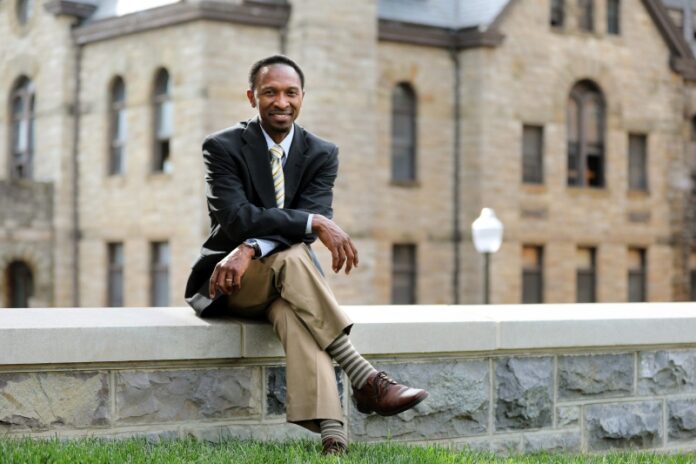Technology once seemed the exclusive domain of technical experts. Today, though, some of the greatest technology challenges involve ethics, policy, culture, and politics.
In response, Virginia Tech has launched Tech for Humanity, a university-wide initiative that will take human-centered approaches to address the societal impact and governance of technological innovations.
“Networks of humans and machines are informing our decisions and improving our lives at home, on the highway, at work, and at play,” said Tim Sands, president of the university, in announcing the initiative. “As Virginia Tech and partners create these technologies, we have the responsibility and the opportunity to do so from the perspective of the human condition, addressing issues of design, access, ethics, policy, and regulation along with the development of the technology.”
Tech for Humanity will touch all of Virginia Tech’s nine colleges and a range of centers and institutes across the university’s campuses in Blacksburg, Roanoke, and Northern Virginia. This breadth of expertise matches the range of issues involved, including ethics, responsible innovation, human-factor design, creativity, data and decision-making, global collaboration, economics, societal values, and sustainability.
“The human-centered guidance of technology, focusing on the societal impact of technology, is already becoming a grand challenge of our time,” said Sylvester Johnson, Virginia Tech’s assistant vice provost for the humanities, who will serve as executive director of the initiative. “Innovation is increasing the gap between what is technologically possible and what may or may not be in the best interest of human society and a viable future. We need human-centered approaches to guide the study, development, and use of technologies.”
Johnson said he believes the initiative launches at a critical time. Few would deny the tremendous value and success that innovations are bringing across areas ranging from health care to communication to finance, he noted. Yet barely a week passes without news of biased outcomes from artificial intelligence applications or Capitol Hill discussions about regulation of technologies that are increasingly staples of modern daily life.
“Failures to address the pitfalls of technologies have already created tremendous problems, some of which threaten to undermine privacy and democracy,” said Johnson, a professor of religion and culture who also directs the Virginia Tech Center for Humanities. “Rapid advances in artificial intelligence, human-machine interfaces, and synthetic biology are increasingly showing that technology isn’t only technical; it’s also social, cultural, political, and economic. Technology is fundamentally a human issue that demands comprehensive, human-centered approaches.”
To meet such challenges, Tech for Humanity will produce research within and across disciplines, convene thought leaders and decision-makers across institutions on critical issues, and help prepare a new generation of undergraduate and graduate students to guide a human-centered future for societies increasingly shaped by innovation.
“As a comprehensive research university that is leading technological innovation, Virginia Tech is uniquely positioned to help drive this new era of human-centered technology,” said Cyril Clarke, executive vice president and provost of Virginia Tech. “In fact, our commitment to a broad, humanistic understanding of technology and how it intersects with our responsibility as a land-grant university is critical to our ability to serve the people of our commonwealth and our nation. Virginia Tech has and will continue to use comprehensive approaches to advance human-centered efforts to study and develop technology innovations.”
Johnson noted that the university’s commitment to human-centered paradigms is evident in plans for its Innovation Campus, a centerpiece of Virginia’s successful bid as the site of Amazon’s second headquarters. The campus — which will be built in Alexandria, less than two miles from Amazon’s Northern Virginia headquarters — is expected to be a preeminent magnet for technology talent, research, and innovation.
There the College of Engineering will train computer scientists and software engineers as a central mission of the new campus. At the same time, the Center for Humanities, based in the College of Liberal Arts and Human Sciences, will help develop technology policy, artificial intelligence ethics, and other human-centered approaches to guide innovations developed at the Innovation Campus and across the university’s other campuses.
This human-centered focus will align with Virginia Tech’s broad commitment to advancing the human condition.
“The liberal arts and human sciences are crucial for understanding the origins, evolution, and implications of technology’s impacts on society and addressing the real-life effects of technology on physical and mental well-being,” said Laura Belmonte, dean of the College of Liberal Arts and Human Sciences. “Indeed, technology is forcing us to grapple with profound questions about what it means to be human.”
Tech for Humanity will partner with the Center for Humanities to bring human-centered scholarship to the forefront across the university and address the ethical governance of technology.
“We chose ‘Tech for Humanity’ to be doubly meaningful,” said Johnson. “The initiative’s name signifies that technology must be guided by human-centered approaches — and that Virginia Tech is committed to serving humanity.”

